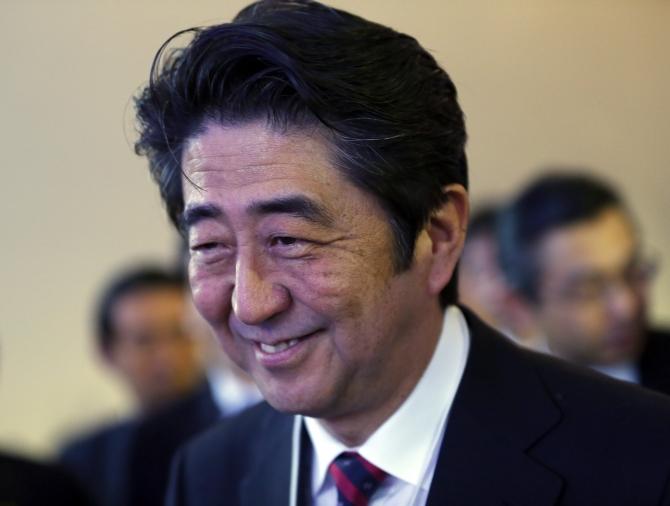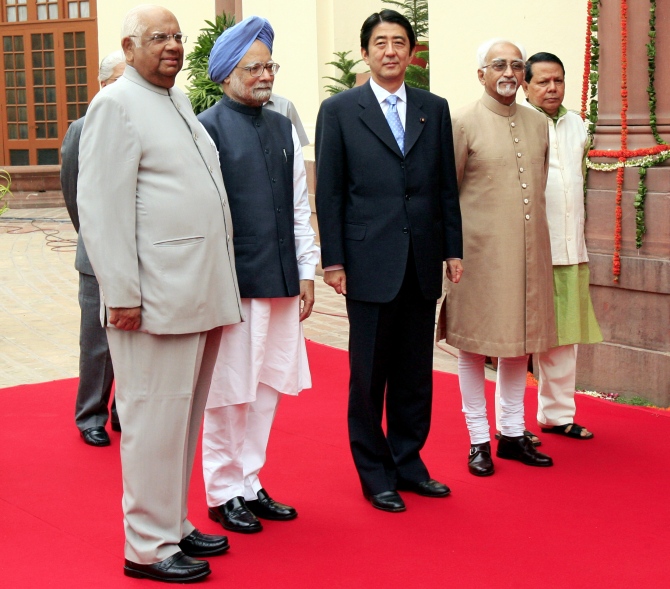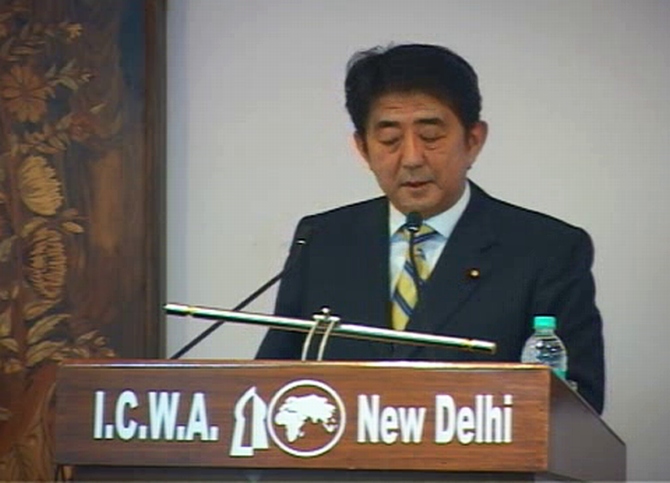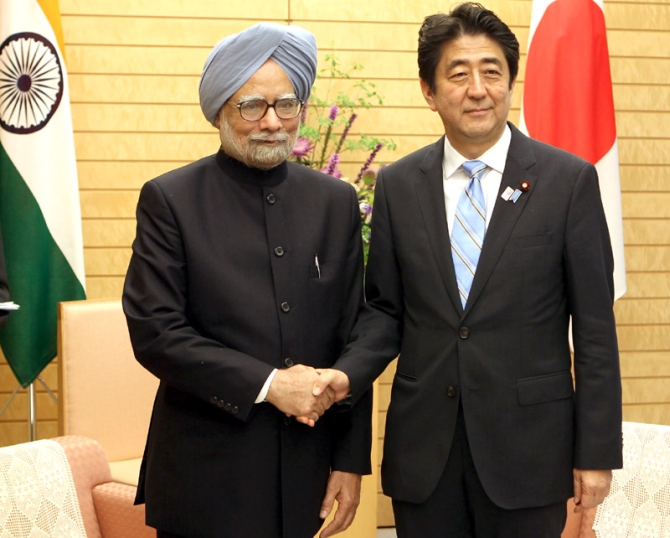 | « Back to article | Print this article |
The significance of Shinzo Abe's India visit
As Japan beefs up its defences against China, both New Delhi and Tokyo seem to have decided to re-energise their relationship to ensure a strategic balance in Asia.
Japan’s Prime Minister Prime Minister Shinzo Abe, who is the guest of honour at this year's Republic Day, will arrive in India on Saturday. He will also be the first ever Japanese dignitary to grace the occasion.
India, sources said, is according high importance to Abe's visit as Japan has been a long standing partner in a host of bilateral and other issues. Japanese Emperor Akihito and Empress Michiko were recently in India on a six-day state visit.
New Delhi and Tokyo view Abe's visit to India, which comes a bit over a month and a half after the historic first ever visit to India of Japanese Emperor Akihito and Empress Michiko, as pinnacle of India-Japan bilateral relations.
They were returning to the country 53 years after their 1960 trip as the crown prince and princess of Japan. Their symbolic visit apart, the fact is that during the last five years, bilateral trade has increased 80 per cent; currently it is at $18 billion.
Although this is nowhere near the India-China bilateral trade figure, which is now inching towards $100 billion, Japan and India have set a goal of $25 billion this year.
It must also be remembered that in recent decades, Japan has quietly extended financial and technical support to several infrastructure projects in India, helping to build metro railway systems and industrial corridors, dedicated freight corridors, highways, bridges and power plants.
The recent stand-off over China's decision to unilaterally enforce an Air Defence Identification Zone in the East China Sea, including the disputed Senkaku/Diaoyu islands, appeared to show the limits of US intervention.
In fact, Asian nations may be better off finding their own solutions to the regional disputes. Individually, they may not be able to stand up to China's bullying, but together there is a chance to keep China in check.
India and Japan, along with South Korea, may have to take the lead in this respect.
India inviting Abe as chief guest for the Republic Day Parade -- an honour normally reserved for its closest allies -- is a clear signal that Asia's two biggest democracies may be ready to work together in containing if not confronting China in the years to come.
Rediff.com profiles the 65th Republic Day chief guest
Click NEXT to read further...
The significance of Shinzo Abe's India visit
Abe first became the 90th Japanese prime minister when he was elected by a special session of the National Diet on September 26, 2006. He became Japan’s youngest prime minister since World War II, and is the first to be born after the war.
Abe served as prime minister for less than a year, resigning on September 12, 2007.
Abe has pushed for stronger India-Japan relations ever since returning as the PM of Japan in end-2012, the first ever former Japanese PM to return to office since 1948.
At an Indian Council of World Affairs lecture in September 2011, Abe said, “A strong India is in the best interest of Japan, and a strong Japan is in the best interest of India.”
Click NEXT to read further...
The significance of Shinzo Abe's India visit
In 2007, Abe became the first ever Japanese PM to address a joint session of Indian Parliament.
He told the Indian members of Parliament about the time India's first PM Jawaharlal Nehru hosted Abe's maternal grandfather the then Japanese Prime Minister Nobusuke Kishi in New Delhi in 1957.
Nehru introduced Kishi at a public reception thus, "This is the Prime Minister of Japan, a country I hold in the greatest esteem." It was rare in the aftermath of the Second World War for a Japanese PM to be felicitated such at a public rally and that too by a leader of Nehru's stature.
Click NEXT to read further...
The significance of Shinzo Abe's India visit
Abe reminisced at his 2011 Indian Council of World Affairsspeech about how deeply Nehru's gesture had touched his grandfather.
Abe said, "As a young boy seated on his knee, I would hear him telling me that Prime Minister Nehru introduced him to the biggest audience he had ever seen in his lifetime of a hundred thousand people. He told me that it was India that came forward before any other country to accept the ODA Japan wanted to extend as a proud member of the international community. For all that, he remained deeply thankful throughout his life."
His granduncle is the late Eisaku Sato, a former premier and winner of the 1974 Nobel Peace Prize.
Click NEXT to read further...
The significance of Shinzo Abe's India visit
Today, Japan and India are the closest of friends. New Delhi has an institutionalised system of annual summits with Tokyo since 2006. Russia is the only other country with which India has this mechanism in place. Prime Minister Manmohan Singh visited Japan in May 2013 for the seventh annual summit.
As two of Asia's bigger democracies and amongst its largest economies it is in New Delhi and Tokyo's interest as also responsibility that the region's maritime commerce continues unimpeded to contribute to mutual economic prosperity not only for India and Japan but also the ASEAN countries.
India still remembers Japan as one of the few countries that helped it during the 1991 balance of payments crisis. In the early-1980s, Japan's Suzuki Motors changed the way Indians travelled by making the dream of owning a car a reality for millions of middle class Indians with its Maruti 800.A little over a decade later, it was Japan again which changed the way Delhi travelled.
Japan's contribution in making Delhi Metro and its help in similar projects in a dozen other cities is well known as its assistance in Delhi-Mumbai Industrial Corridor Project and Dedicated Freight Corridor Projects on the Mumbai-Delhi and Delhi-Howrah routes.
TOP photo features you missed last week
Click on MORE to see another PHOTO features...





